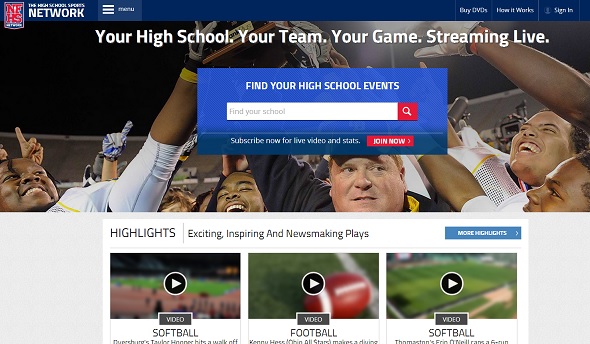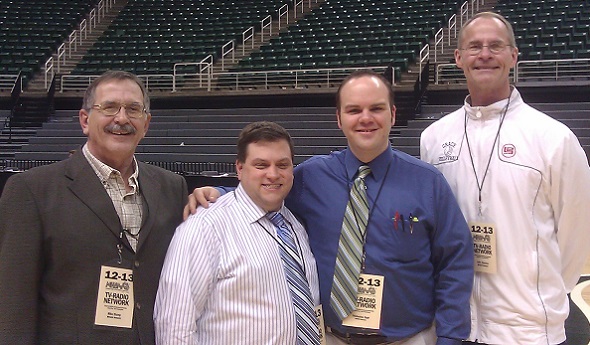
NFHS Network Rooted in Our Back Yards
August 28, 2014
By Jack Roberts
MHSAA Executive Director
Throughout my nearly 28-year tenure with the MHSAA, I have been a consistent and outspoken critic of our national organization, the National Federation of State High School Associations (NFHS), whenever it attempted an initiative that I saw purposed more for its own promotion than as a needed service for its member associations and their member schools.
When its strategy for service was to promote a “national presence” for the NFHS, I objected. I have never felt that national tournaments or national telecasts would be of the slightest benefit to 99 percent of the MHSAA’s member schools; and worse, I have always believed that those initiatives would tend to corrupt the one percent involved.
So it may have come as a surprise to some of my colleagues in this state and my counterparts across the country when I became an early advocate of the NFHS Network and now serve as the network’s first president.
The definitive difference between the NFHS Network and earlier talk of national tournaments and telecasts is that the network’s thrust is local, not national. In fact, it’s hyper-local.
The heart of the NFHS Network consists of the season-ending tournaments of statewide high school associations across the U.S. The NFHS Network produced Internet broadcasts of at least the culminating contests for most of the sports sponsored by most of the three dozen state associations contributing content during 2013-14, the network’s first year of operation.
While state high school associations provide an immense potential for content, there are only 51 member associations of the NFHS, in contrast to the coast-to-coast pool of nearly 20,000 member high schools these associations serve. It is this local content through the School Broadcasting Program that gives the network its legs. The aggregation of all this content is the magnet to draw media partners, sponsors and subscribers; and it is this local emphasis that attracted my support of the concept, and now my service to the network board of directors.
School sports is first, last and always about local teams. And it’s not just high-profile sports and varsity teams; it’s just as much about lower profile programs and subvarsity events.
There are more school-sponsored football games in Michigan during one week than there are NFL games across the U.S. all season long. There are more school-sponsored basketball games in Michigan during one week than there are NBA games across the U.S. all season. And we serve two dozen other sports as well.
Together, the MHSAA and the SBP can provide enough live and on-demand Internet programming to provide MHSAA.tv with authentic high school sports broadcasts 24 hours a day, seven days a week, 365 days each year. And those who subscribe to Internet broadcasts on MHSAA.tv have access to content from the local school and state association level from coast to coast and border to border.
The success of the NFHS Network will not be “made-for-TV” national-scope tournaments or matchups between teams with the most highly recruited players. Our success will come from the aggregation of thousands of typical local rivalries that are played all school year long in every nook of this state and every cranny of our nation.
At least while I’m involved, the NFHS Network will be true to the mission of school-based sports and uplift the values for which educational athletics have always stood.
For years, school sports have stood apart from non-school sports as the preferred brand of youth sports because we offered letter jackets, pep assemblies, pep bands, marching bands, cheerleaders and homecomings. Going forward, school sports will also stand apart from other youth sports because of the NFHS Network.

MHSAA Gets Word In During Video Age
September 3, 2014
By Rob Kaminski
MHSAA benchmarks editor
The Buggles’ leadoff single for MTV’s Opening Day on Aug. 1, 1981, started a rally – OK, a revolution – in the music industry that would last decades.
“Video Killed the Radio Star” certainly had a lasting impact, and the song and its one-hit-wonder artist are now an intertwined answer in music trivia lore.
But, the game is still going on. The radio star is far from dead, and, in fact, MTV rarely shows music videos any more.
True, video is everywhere, from laptops to tablets to phones. So, too, is music – and the spoken word in the form of podcasts, audiobooks, and, yes, play-by-play of athletic events.
The MHSAA Network has been providing the latter for prep enthusiasts for decades, entering the world of webcasting around the turn of the millennium.
Having broadcasts available online has done wonders to increase the number of stations and listeners. Prior to the foray into internet broadcasts, dedicated ISDN phone lines and a satellite were required for content to reach the network affiliates.
John Kreger, the primary voice of MHSAA Championships, has been there through the transition, and sees only a bright future ahead.
Prior to the 2003-04 school year, the MHSAA entered a partnership with TBC Sports to air its radio broadcasts for tournaments. Working with TBC owner Will Tieman at that time was Kreger.
“This was before the Network was online, and Will said to me, ‘Hey John, I have a project for you,’” Kreger recalls. “Well, I jumped at the opportunity and he let me run with it. There are times I still want to pinch myself to make sure I’m really able to watch and broadcast all these events.”
After four years with TBC, the MHSAA Network moved its operations to online vendor EZStream, allowing for greater growth and easier access for all involved.
“EZStream really stepped up its quality in recent years, and once our stations no longer needed a satellite receiver, getting games on the air became much simpler,” Kreger said. “All they need to do is point and click to get the feed. It’s a low-cost – almost no-cost – way for stations around the state to tell the story of high school sports.”
No one enjoys telling that story more than Kreger, now in his 11th year calling MHSAA events. His broadcast career has placed him on radio row at Stanley Cup, NBA and MLB playoffs, but it’s talking about his MHSAA Tournament gig that revs his voice to a pitch normally reserved for the final seconds of a prep title game at Ford Field, Breslin or Compuware.
“High school sports is the only pure form of sports left. As a professional reporter and broadcaster I spend most of my year dealing with playing time and sneaker deals,” Kreger said. “But for nine weeks out of the year I get to broadcast sports which the MHSAA has made into a showcase about students, and I am honored to do this. The looks on those kids’ faces when they take the same court or field they see on TV, knowing they reached the pinnacle, there’s no rush like it in sports. I’ll take high school events every day of the week and twice on Sunday.”
The 2008 MHSAA Ice Hockey Final seemed like it might indeed push Kreger into action on a Sunday. The last game of the weekend, the Division 1 tilt between Marquette and Orchard Lake St. Mary’s, went eight overtimes before it was declared a tie. It was one of Kreger’s most memorable moments.
“It was our first year doing hockey on the Network, and being on the air, just being a small part of that, and seeing the MHSAA make the right call and declare a tie; it is something I’ll never forget,” Kreger said. “I’ve been on air enough to hear the cliché, ‘What a great game; too bad someone had to lose,’ too many times, or at times where that might not have been the case. Well, no one deserved to lose that night, and the MHSAA made a great decision. I’m proud to have seen that.”
Thanks to Kreger and the Network, thousands of people continue to “see” games they can’t attend. For the 2014 winter season, approximately 7,000 unique listeners tuned in to the MHSAA Ice Hockey, Girls Basketball and Boys Basketball Finals.
Audio continues to thrive and serve its audiences for a number of reasons.
“Personally, one of the reasons I stay with audio is because we have the opportunity to tell a story and allow the listener to create their own picture,” Kreger said. “Radio broadcasts are much more descriptive, whereas TV broadcasts serve more as guides to what people are already seeing.
“One of my idols is Ernie Harwell, who said, ‘In radio, nothing happens until the broadcaster says it does.’ In that respect, there’s more anticipation and imagination for the listener. Think of the iconic moments like the Bobby Thompson home run. It’s always the radio feed. It takes people back to where they were at the moment.”
That’s another key advantage to audio. If people can’t attend an event, they can listen. Even in today’s world of hand-held video devices, there are times when listening is simply more conducive than watching, whether working around the house, exercising or driving to and from appointments.
“Radio is a lot more accessible to people. It’s a constant companion, and that’s the beauty of it,” Kreger said.
Like its video brethren, audio listeners are turning to mobile devices as the tool of choice. Of the 7,000 customers this past winter, nearly one-third were mobile listeners.
Kreger has been an amiable companion for Michigan prep enthusiasts for the past decade, and he hopes they keep inviting him along wherever their travels take them. He also lauds the MHSAA for expanding its menu.
“The MHSAA is to be commended for expanding the schedule to more than just football and basketball,” Kreger said. “The more sports we can bring to people, the better.”
If Kreger could be in two places at once, there’s no doubt he’d accept the assignment as long as it had the MHSAA stamp on it. Perhaps that’s because his values and perspective are so closely aligned with the mission of school sports and the MHSAA.
“The first rule of high school sports is that this isn’t life. It’s part of life,” he said. “The athletes will become doctors, lawyers and teachers. The coaches are teachers, doctors and auto workers. We don’t sugar coat. I try to be true to the game, to be honest and accurate, and all the while I remember perspective. Above all else, I try to remain respectful of the game.”
PHOTO: The faces behind some of the familiar voices on the MHSAA Network are, from left, Mike Stump, John Kreger, Denny Kapp and John Spooner.

